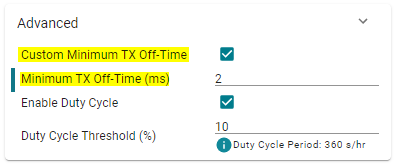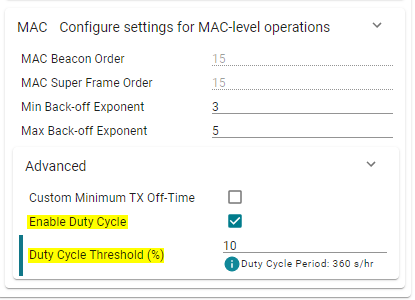ARIB Regulation Type¶
When using the ARIB regulation type, certain TI 15.4-Stack features are different. This section covers these features.
For information on how to choose regulation type, see Data Rate and PHY.
Minimum Tx Off Time¶
The minimum TX off-time, also known as the pause duration, specifies the minimum amount of time during which the transmitter shall remain off following any transmission. According to the regulation, a minimum Tx off time of 2 ms is implemented. Packets that are scheduled with less than the min tx-off time interval will be delayed until the minimum Tx off time has passed.
Configuring Min-Tx-Off¶
Min-Tx-Off is always enabled when using ARIB mode. If you set Minimum TX Off-Time (ms) to 0, it’s equivalent to disabling this feature. If you want to use 0 or a custom value for minimum Tx off time, follow the steps below.
Open SysConfig -> RF STACKS -> TI 15.4-Stack -> Network -> MAC -> Advanced
To enable the feature, check the box next to Custom Minimum TX Off-Time
You can choose a time in ms.

Figure 77. Configure minimum Tx off time in SysConfig.¶
Duty-Cycling¶
The purpose of Duty Cycling is to limit the amount of data a device can send in a given time frame and is governed by regulations. Duty cycling is measured in air time. Air time includes all tx, including both the first transmission and retransmission of data packets. ACK frames can be ignored as their packet sizes are negligible.
When duty-cycling is active, the TI 15.4-Stack keeps track of and restricts the time spent in Tx by the device. The TI 15.4-Stack keeps track of all packets sent during the last 5 minutes. When a packet is scheduled, whether from the application or from the stack, the duty-cycle is checked before transmitting it.
If the maximum permitted “Tx on time” has already been spent, the packet will be denied. In this case a Channel Access Error is thrown.
You can use a PIB retrieval API to check your current duty-cycle status. Please see Duty Cycle PIB Access and Diagnostics.
Configuring Duty-Cycling¶
To enable or disable duty-cycling, open SysConfig:
Open SysConfig -> RF STACKS -> TI 15.4-Stack -> Network -> MAC -> Advanced
Check or uncheck the box next to Enable Duty Cycle to enable or disable duty-cycling.
You can also set the duty cycle threshold. When you set a new threshold value, SysConfig will calculate and display your duty cycle period.

Figure 78. Configure Duty-Cycling in SysConfig.¶
Duty Cycle PIB Access and Diagnostics¶
The following global variables can be used to check the duty cycle status. They
are defined and documented in api_mac.h.
Attribute name |
Data Type |
Get |
Set |
ApiMac_attribute_dutyCycleEnabled |
Bool |
ApiMac_mlmeGetReqBool |
ApiMac_mlmeSetReqBool |
ApiMac_attribute_dutyCycleStatus |
uint8_t |
ApiMac_mlmeGetReqUint8 |
ApiMac_mlmeSetReqUint8 (only for debug purposes) |
ApiMac_attribute_dutyCycleRegulated |
uint32_t |
ApiMac_mlmeGetReqUint32 |
ApiMac_mlmeSetReqUint32 |
ApiMac_attribute_dutyCycleUsed |
uint32_t |
ApiMac_mlmeGetReqUint32 |
ApiMac_mlmeSetReqUint32 (only for debug purposes) |
ApiMac_attribute_dutyCyclePtr |
uint32_t |
ApiMac_mlmeGetReqUint32 |
ApiMac_mlmeSetReqUint32 (only for debug purposes) |
ApiMac_attribute_dutyCycleBucket |
Array of length: sizeof(DC_NODE_ENTRY_s) * DUTY_CYCLE_BUCKETS |
ApiMac_mlmeGetReqArray |
ApiMac_mlmeSetReqArray (only for debug purposes) |
You will also find
ApiMac_attribute_dutyCycleLimitedandApiMac_attribute_dutyCycleCriticaldefined, however these are not used by TI 15.4-Stack.
Beacon Mode¶
When using beacon mode, the TI 15.4-Stack will make sure there is always duty cycle budget for beacon frames. This is done by pre-allocating beacon frames. Scheduled packets will thus be compared to:
What frames have already been sent
Which beacon frames will be sent
Note
When using ARIB duty-cycling, it is not possible to go below beacon order 4. This is because the beacon frames alone would exceed the permitted duty-cycling.
Clear Channel Assessment (CCA)¶
Clear channel assessment (CCA) is performed for all packets longer than 5 ms. This means ACK packets do not need CCA.
Packet Sniffer¶
For instructions on how to configure and use the SmartRF Protocol Packet sniffer with ARIB mode, please see SmartRF Protocol Packet Sniffer.
Coprocessor Example¶
When using the coprocessor example, it should be noted that ARIB specific features that are enabled (duty-cycling, min-tx off) will be used by all PHYs. This means, even if FCC is selected over the NWP interface, these restrictions will still be enforced.